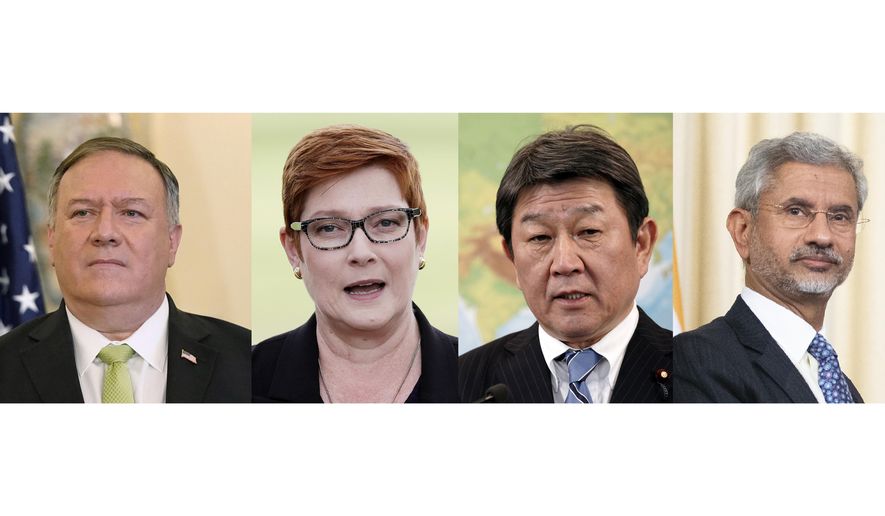Japan will host a high-level security dialogue next week with the U.S., India and Australia — bringing together the pro-democracy nations of the so-called “Quad” at a moment of mounting suggestion from the Trump administration that the informal grouping could be the foundation for an “Asian NATO” alliance aimed at containing China.
Secretary of State Mike Pompeo is expected to join his Japanese, Indian and Australian counterparts for the meeting in Tokyo, according to an announcement Tuesday by Japanese Foreign Minister Toshimitsu Motegi. It will be the first in person Quad gathering since the emergence in recent weeks of Japan Prime Minister Yoshihide Suga as the successor of former Prime Minister Shinzo Abe, who first initiated the grouping back in 2007.
While resistant to some multilateral institutions, the Trump administration has generally embraced the Quad as part of its 2017 Indo-Pacific strategy, with some officials more recently suggesting the grouping is ripe for expansion given communist China’s rise as a global super power engaged in increasingly aggressive military and economic posturing.
Next week’s gathering comes just more than a month after U.S. Deputy Secretary of State Stephen E. Biegun suggested the Quad could be the beginning of a NATO-style alliance.
“It’s something that I think in the second term of the Trump administration or, were the president not to win, the first term of the next president, it could be something that would be very much worthwhile to be explored,” Mr. Biegun said at a U.S.-India strategic dialogue on Aug. 31.
Senior officials from the four powers — all of which have had tense recent relations with China — held a virtual meeting last week, according to Indian news reports. The Indian Ministry of External Affairs said the four countries called for a “free, open, prosperous and inclusive” Indo-Pacific region based on shared valued and respect for international law.
There are, however, indications that New Delhi strongly resists the idea of a more formal security alliance focused on countering China militarily. India separately participates in regular strategic dialogue directly with Russia and China, despite tensions between Delhi and Beijing.
In his remarks in late August, Mr. Biegun said an Asian NATO would be about more than simply countering China, and could focus on broadly coordinating militaries and economies of the region’s smaller nations around a rules-based value system.
“It is a reality that the Indo-Pacific region is actually lacking in strong multilateral structures. They don’t have anything of the fortitude of NATO or the European Union. The strongest institutions in Asia oftentimes are not inclusive enough,” he said. “There is certainly an invitation there at some point to formalize a structure like this.”
The Japanese media outlet Kyodo News noted that next week’s gathering will be the first ministerial-level multi-party conference hosted by Tokyo since the start of the coronavirus pandemic and follows.
“It is timely that foreign ministers of the four nations who share the same ambitions over regional matters exchange views over various challenges,” Mr. Motegi told a press conference, according to Kyodo News.
“The vision of the free and open Indo-Pacific is increasing its value in the post-coronavirus world and I hope to affirm at the foreign ministerial meeting the importance of further deepening coordination with many countries toward realizing this vision,” he said.
• Guy Taylor can be reached at gtaylor@washingtontimes.com.




Please read our comment policy before commenting.